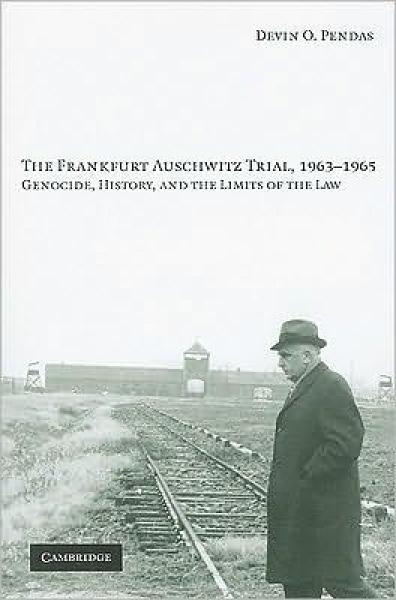Description
The Frankfurt Auschwitz trial was the largest, most public, and most important trial of Holocaust perpetrators conducted in West German courts. Drawing on a wide range of archival sources, Devin O. Pendas provides a comprehensive history of this momentous event. Situating the trial in a thorough analysis of West German criminal law, the book argues that in confronting systematic, state-sponsored genocide, the Frankfurt court ran up against the limits of law. This book provides a compelling account of the divided response to the trial among the West German public.
Drawing on a wide range of archival sources, this book provides a comprehensive history of the Frankfurt Auschwitz trial.
Devin O. Pendas is Associate Professor of History at Boston College. He received his PhD from the University of Chicago and is the recipient of grants from the German Academic Exchange Service and the MacArthur Foundation. His articles have appeared in the Yale Journal of Law and the Humanities and Traverse: Zeitschift für Geschichte/Revue d'histore, as well as in a number of edited volumes.
"...provides a meticulously detailed and comprehensive analysis: from the pretrial history to its public repercussions; from the courtroom proceedings to their wider political and legal contexts (the Cold war, the politics of the past in the Federal Republic, German criminal law, and so on)."
-Journal of Genocide Research
"He has written an important, elegantly argued, and meticulously researched book that enriches our understanding of a crucial legal event."
-Lawrence Douglas, American Historical Review
"In his book, Devin O. Pendas meticulously examines every phase of the trial. He provides an in-depth account of the complex, lengthy legal and political machinations that preceded the trial, moves on to an exhaustive analysis of the actual courtroom proceedings and concludes with an assessment of German public reactions. The extremely detailed narrative will certainly satisfy readers who prefer encyclopedic rigor, although others might consider the book's reconstruction of the procedural maneuvers during the trial to be denser than necessary, despite the author's formidable lucidity. The impressive archival research on which the book is based is well reflected in its extensive citations, which Cambridge University Press admirably continues to print at the bottom of the page."
- Alan E. Steinweis, University of Nebraska-Lincoln, H-NET
Drawing on a wide range of archival sources, this book provides a comprehensive history of the Frankfurt Auschwitz trial.
Devin O. Pendas is Associate Professor of History at Boston College. He received his PhD from the University of Chicago and is the recipient of grants from the German Academic Exchange Service and the MacArthur Foundation. His articles have appeared in the Yale Journal of Law and the Humanities and Traverse: Zeitschift für Geschichte/Revue d'histore, as well as in a number of edited volumes.
"...provides a meticulously detailed and comprehensive analysis: from the pretrial history to its public repercussions; from the courtroom proceedings to their wider political and legal contexts (the Cold war, the politics of the past in the Federal Republic, German criminal law, and so on)."
-Journal of Genocide Research
"He has written an important, elegantly argued, and meticulously researched book that enriches our understanding of a crucial legal event."
-Lawrence Douglas, American Historical Review
"In his book, Devin O. Pendas meticulously examines every phase of the trial. He provides an in-depth account of the complex, lengthy legal and political machinations that preceded the trial, moves on to an exhaustive analysis of the actual courtroom proceedings and concludes with an assessment of German public reactions. The extremely detailed narrative will certainly satisfy readers who prefer encyclopedic rigor, although others might consider the book's reconstruction of the procedural maneuvers during the trial to be denser than necessary, despite the author's formidable lucidity. The impressive archival research on which the book is based is well reflected in its extensive citations, which Cambridge University Press admirably continues to print at the bottom of the page."
- Alan E. Steinweis, University of Nebraska-Lincoln, H-NET
Last updated on
Product Details
- Cambridge University Pres Brand
- Mar 8, 2010 Pub Date:
- 052112798X ISBN-10:
- 9780521127981 ISBN-13:
- 340 Pages
- 8.9 in * 5.9 in * 0.9 in Dimensions:
- 1 lb Weight:




